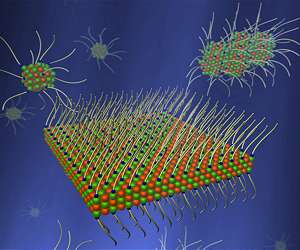Solar roofing panels that can be printed on steel used in building construction are being studied in a new three-year collaboration between Swansea University researchers and Tata Steel U.K.
The technology, called “Active Buildings,” is being researched to reduce reliance on fossil fuels and to ease demand on the British national power grid, according to Swansea University.
“This technology will help us tackle the energy crisis and the climate crisis at the same time,” Dave Worsley, professor and head of materials science and engineering at Swansea, said in a statement.
“The future is about solar energy technology being built in, not added on afterwards. These printable solar cells can be built into the fabric of our homes, shops and offices, allowing them to generate the power they need, and more besides,” Worsley said.
Worsley said the concept works and has been demonstrated in “Active Buildings” in the southwestern Wales city of Swansea.
“We are buoyant with the possibilities that the perovskite technology brings to the table — especially in integration to the building and construction solutions – across different value streams in Tata Steel,” said Sumitesh Das, Tata U.K.’s director of research and development.
Perovskite is a new kind of solar cell.
According to Swansea researchers, enough solar energy falls on Earth in just one hour to meet the energy needs of the entire world for a year.
Traditional solar cells are made from silicon, which is expensive and requires a lot of energy to produce. But a perovskite solar cell is a cheaper and lighter, highly efficient alternative to the silicon-based cells.
Swansea University said manufacturing these new solar cells emits less than half the carbon compared to a silicon cell.
The non-partisan group Environment America said in January of this year that installing solar panels on the roofs of U.S. superstores could generate enough energy to power 8 million homes.
Related Links
All About Solar Energy at SolarDaily.com
|
We need your help. The SpaceDaily news network continues to grow but revenues have never been harder to maintain. With the rise of Ad Blockers, and Facebook – our traditional revenue sources via quality network advertising continues to decline. And unlike so many other news sites, we don’t have a paywall – with those annoying usernames and passwords. Our news coverage takes time and effort to publish 365 days a year. If you find our news sites informative and useful then please consider becoming a regular supporter or for now make a one off contribution. |
||
|
SpaceDaily Contributor $5 Billed Once credit card or paypal |
SpaceDaily Monthly Supporter $5 Billed Monthly paypal only |
|

![]()
Boost for nanomaterials research – solar cells and LEDs
Swansea UK (SPX) Jul 14, 2022
Chemistry expert secures Humboldt Foundation funding to recruit scientists for nanomaterials research
An expert in nanomaterials who is based in Swansea and Germany has secured around Pounds 250,000 of funding from the Humboldt Foundation to recruit early-career scientists to join his research team.
Professor Christian Klinke, who works jointly at the University of Rostock in northern Germany and in Swansea University chemistry department, has been appointed as a Henriette Herz Scout by the Humb … read more
